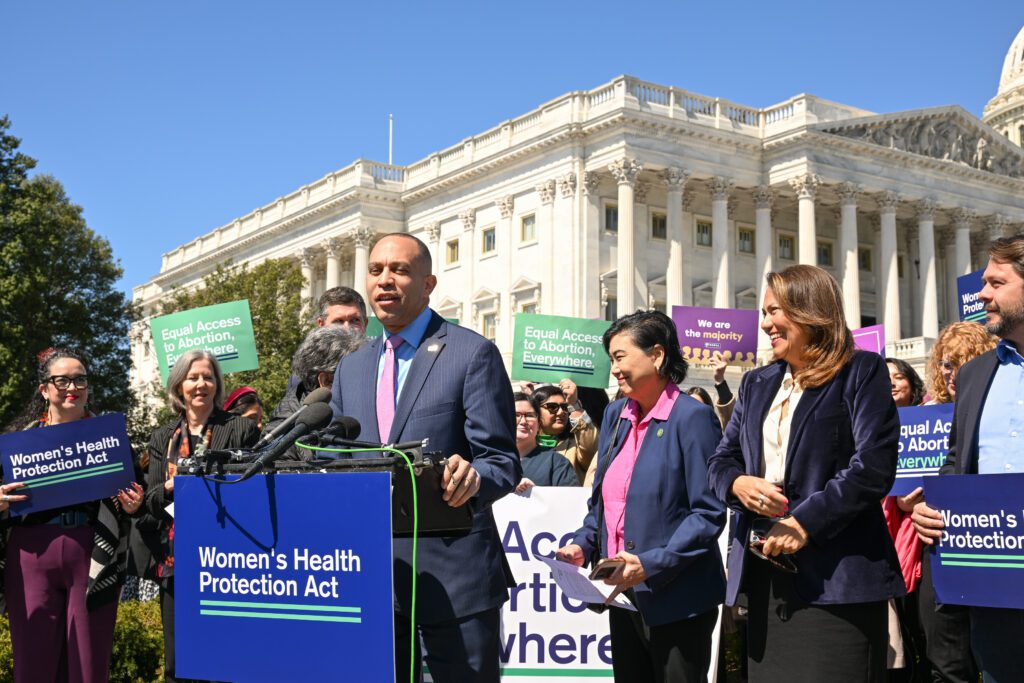Pro-Choice Champions in Congress Reintroduce Historic Women’s Health Protection Act
Legislation fights back against attacks on reproductive health care, protects access to safe and legal abortion in U.S.
(PRESS RELEASE) Renewing their commitment to the health and rights of women in the United States, Senators Richard Blumenthal and Tammy Baldwin and Representatives Judy Chu, Lois Frankel, and Marcia Fudge today will reintroduce the Women’s Health Protection Act—legislation designed to enforce and protect the right of every woman to decide for herself whether to continue or end a pregnancy, regardless of where she lives.
Today’s introduction comes on the eve of the 42nd anniversary of the historic U.S. Supreme Court’s Roe v. Wade decision recognizing a woman’s constitutional right to abortion and in the midst of anti-choice politicians in Congress aggressively advancing an extreme, unconstitutional federal abortion ban.
Said Nancy Northup, president and CEO of the Center for Reproductive Rights:
“Year after year, anti-choice politicians have passed underhanded laws to shut down clinics and block access to essential reproductive health care. It is critical for Congress to step in to protect the health, dignity, and rights of women across the nation by enacting the Women’s Health Protection Act.
“This historic legislation would put an end to this assault on women’s health and personal decisions. The Women’s Health Protection Act will ensure that every woman in America can exercise her constitutional right to access safe, legal abortion care without interference from the devious tactics of politicians bent on substituting their judgment for hers.
“We commend the champions of the Women’s Health Protection Act in Congress and stand with them as they advance legislation to stop the sham and truly support the health, rights, and lives of every woman in the U.S.”
The Women’s Health Protection Act was first introduced in the 113th Congress in November 2013—garnering 35 sponsors in the Senate and 133 in the House—and debated before the Senate Judiciary Committee in July 2014.
The Women’s Health Protection Act, which was a key part of significant push-back against legislative attacks on women’s reproductive rights in the last Congress, would prohibit states from imposing restrictions on reproductive health care providers that apply to no similar medical care, interfere with women’s personal decision making, and block access to safe and legal abortion services.
Tomorrow, in honor of the Roe v. Wade anniversary, the New York City Council is hosting a press conference and rally in support of the Women’s Health Protection Act—joining elected officials in Austin (TX), Houston (TX), San Francisco (CA) and Dane County (WI) to call for the bill’s passage.
The Women’s Health Protection Act would prohibit state and federal politicians from imposing a range of dangerous, anti-choice provisions, including:
- Targeted restrictions of abortion providers (TRAP), including clinic shutdown laws that single out women’s reproductive health care providers with regulations that grossly exceed what is necessary to ensure high standards of patient safety and quality of care.
- Bans on abortion prior to viability that violate women’s constitutional rights established by Roe v. Wade.
- Restrictions on women’s access to medication abortion, such as requiring physicians to adhere to an outdated and less safe protocol when providing women with this safe and effective method of ending a pregnancy in its earliest weeks.
- State-mandated medical procedures and protocols, such as compelling women to undergo forced ultrasounds for no medical reason and designed to shame women for their personal decisions.
For more than 20 years, the Center for Reproductive Rights has brought the full power of the U.S. Constitution and courts to bear to ensure that anti-choice politicians in the U.S. do not turn back the clock on reproductive rights. The Center’s legal efforts have helped block laws attacking women’s rights and health all across the nation, including recent injunctions against Texas’s far-reaching clinic shutdown law that would have left just a handful of abortion providers in the entire state, North Carolina’s demeaning forced ultrasound law, and extreme bans on abortion as early as six and 12 weeks of pregnancy in North Dakota and Arkansas, respectively.

